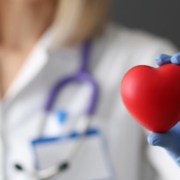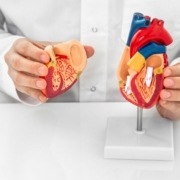10 Possible Signs of Heart Disease
The main reason why many people die after a heart attack is that they do not recognize the first signs of heart disease. What are the signs of heart disease? Often, the symptoms of heart disease are not very specific; they can be confused with other health issues, such as acid reflux, peptic ulcer disease, stomach upset, muscular chest pain, and the list can actually be quite long.
The heart is a fragile muscle, and if it does not continually have blood pumping to it, the muscle fibers can be permanently damaged. Not all symptoms of heart disease present with chest pain and the first symptoms may include leg swelling or even sweating. If the diagnosis of a heart attack is delayed, it might even result in death. It’s important to know the first signs of heart disease.
Recognizing the Symptoms
By recognizing the first symptoms of heart disease, one can seek early care and, consequently, the prognosis also improves. This is vitally important if you are over the age of 55 and/or have risk factors for heart disease.
The more risk factors you have, the greater the probability that the symptoms may be related to your heart. If you have a family history of heart disease or have risk factors for heart disease, here are the first signs of heart disease of which you need to be aware.
Chest Pain/Discomfort
The most common symptom of heart disease is chest pain. Also referred to as angina, it usually indicates that the heart muscle is not receiving adequate blood. The chest discomfort may present as pressure, a squeezing sensation in the chest area, a burning pain, or a feeling of heaviness.
The duration of chest discomfort may vary from 30 seconds to a few minutes. The chest discomfort usually comes on during some type of physical activity, but it can also occur when at rest. In most cases, there is no localized spot where you feel the pain, but it can be all over the chest area. This is one symptom that should be checked out if the chest discomfort is severe and does not disappear.
Another hint that this may be a heart attack is if the chest pain disappears at rest or after you take nitroglycerin. It is very important to know that some women may have a heart attack without developing chest discomfort (silent heart attack or myocardial infarction [MI]).
Nausea
Some individuals may also complain of nausea or heartburn during a heart attack. While vomiting is rare, it can also occur at the same time as nausea. These symptoms tend to be more common in women than men.
Unfortunately, nausea can also occur after eating, indigestion, and many other illnesses, and the healthcare provider must have a high index of suspicion that nausea may be related to your heart before naming it possibly as such.
Radiating Pain to the Left Arm
One of the first signs of heart disease can be radiating pain to the left arm. The pain usually starts in the mid-chest and gradually moves into the neck, then to the left arm, and sometimes to the lower back. This type of pain is a good indication that you may be suffering from an acute heart attack.
Lightheadedness or Dizziness
Some individuals with heart disease may feel dizzy or unsteady on their feet. But lightheadedness can also be caused by many other disorders as well, including low blood sugar, low blood pressure, or standing up very fast. If, however, it is associated with chest discomfort or difficulty breathing, you need to call 911 ASAP.
Extreme Fatigue
A heart attack occurs when the heart is not getting enough blood pumped to it, and this can affect the rest of the body. Consequently, you will generally feel exhausted and tired. Even minor physical activity may make you very exhausted. If you suddenly develop severe exhaustion after doing an activity with which you had no previous problems, you should get yourself checked for a heart problem.
For example, if you regularly walk up 10 steps in your home with no problem, but one day you feel exhausted after just climbing 5 steps, you need to see a healthcare provider. Extreme exhaustion after a heart attack is much more common in women than men.
Sweating
Sweating can occur from many causes, but it can also occur during a heart attack. If you break out in a sweat for no apparent reason, especially if you are sweating heavily and also note chest discomfort, you should think about a potential heart problem.
A Persistent Cough is Another Sign of a Heart Problem
People who have heart failure will have a persistent cough with copious sputum production. This is a serious symptom and should not be ignored. The reason for the cough and sputum production is that there is fluid accumulating in your lungs because the heart is not able to pump it to the kidneys to get rid of it.
Swollen Ankles and Feet
When your heart doesn’t pump the blood effectively, this can lead to swelling of the legs, ankles, and feet. This is a very common symptom in patients with heart failure. You may also notice that you have gained weight; this is most likely due to the accumulation of fluids. You may first notice that you are not able to put on your shoes because your feet are swollen and, with time, the swelling will increase in the upper leg.
Feeling Short of Breath When Lying Down
Another classic feature of a poorly functioning heart is that you may not be able to lie down or sleep well. The reason might be that there is fluid congestion in your lungs which makes it very difficult to breathe. You will note that you have to sleep sitting upright to avoid breathing problems.
Palpitations
A very common symptom of heart disease is palpitations or feeling a thumping beat in your chest. These palpitations may be irregular and may appear at any time, even during sleep. They are often associated with a sense that something bad is going to happen.
There are many causes of palpitations, and it is important to see your healthcare provider as soon as possible to discern the cause. It may be as simple as perhaps you are drinking too much coffee, but an irregular heartbeat should always be checked out by your healthcare provider.
Conclusion
What are the signs of heart disease? Several different symptoms can present and show up as the first signs of heart disease. If you are over the age of 55, have a family history of heart disease, or have risk factors for heart disease, these symptoms should not be ignored. Always contact your healthcare provider as soon as possible. In addition, if you are having chest pain or difficulty breathing, call 911. Do not attempt to drive yourself to the nearest emergency room.
Cano Health recently launched its cardiovascular disease prevention program, Healthy Heart by Dr. Juan Rivera to help individuals to recognize the signs of heart disease and improve the odds of surviving a heart attack or stroke by knowing what to do at that time. Cano Health is a leader in providing care and wellness programs for seniors and those in our communities who are underserved. Call them today at 1-855-447-6059 to learn more.






